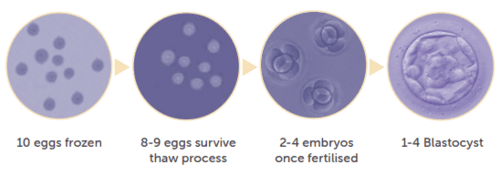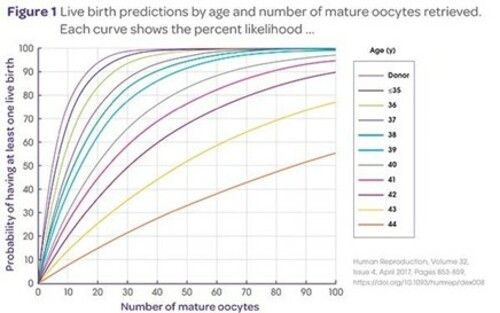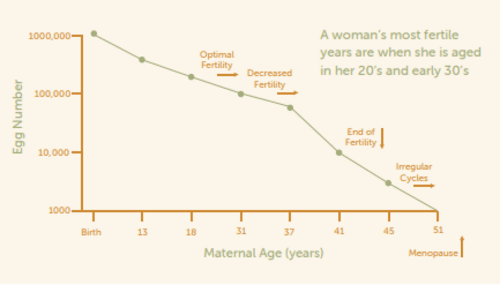
Egg Freezing Success Rates
The live birth rates using frozen eggs depend heavily on the age of the woman when the eggs were collected and frozen, irrespective of the age at attempted pregnancy. In an average egg freezing cycle, 90% of eggs will survive thawing, 70% fertilisation and 30-40% would be developed into a pregnancy.

On average a woman under the age of 35 will have 10 mature eggs collected in a single procedure, but this number reduces by approximately 1 egg per year above 35.
The age at egg collection also influences the chance that a mature egg will successfully thaw, fertilise, develop to blastocyst and become a live birth.
Currently, we would expect that:
- A stimulated cycle would ideally result in the collection of 10 eggs (for women under 35) but this is extremely variable and depends on many factors including the egg-freezing patients’ age, general health, ovarian reserve and current ovarian function.
- Approximately 90% of eggs would survive thawing.
- Approximately 70% of surviving eggs would fertilise.
- Approximately 40% of fertilised eggs would develop into good-quality embryos depending on the age of the woman and her inherent egg quality.
- A single embryo would have a 30-40% chance of developing into a clinical pregnancy for women under 38 years, with the same chance of miscarriage as any other woman of the same age. However, for every 10 eggs collected, as with fresh eggs, only one to four embryos would be expected to develop.
- Please note that all information relates to a non-smoker. Smoking significantly impairs fertility and reduces egg quality.
- Do note that the success rate of egg freezing is particularly uncertain for women who have already passed their 38th birthday.
Once an egg survives the thawing process, we would expect it to behave like a fresh egg:
- Approximately 70% of eggs would fertilise.
- 40% develop onto day five (blastocyst embryos).
- A single embryo would have a 30-40% chance of developing into a pregnancy for women who froze their eggs at 35 years or below.

Egg freezing success rates by age
During a woman’s reproductive years, the ovary contains hundreds of thousands of immature eggs. Usually, over the course of a few weeks, multiple immature eggs start to develop in a wave and then most stop growing, while one ripe (“mature”) egg continues to develop and is released each cycle. As a woman gets older, the number of eggs available to go through the maturing process becomes less, until by the age of 50 or so, no healthy eggs remain. A woman’s most fertile years are when she is aged in their 20s and early 30s when the ovaries still contain a large number of healthy eggs. For the 10–15 years prior to menopause, despite a woman having regular ovulatory cycles (monthly periods), the ovarian function deteriorates. This is especially so in older women in their forties who have less chance of producing a healthy pregnancy because of the age-related decline in egg quality.
For more information about your specific condition, talk to an egg-freezing specialist either online or at a fertility clinic.

How many eggs should you freeze?
The more eggs the higher chance that one will induce a successful pregnancy. We generally recommend collecting around 20 eggs to maximise the chances of success.
Egg freezing success rates common questions
What percentage of eggs survive freezing?
Of the 10 eggs that are taken in an average egg freezing cycle, on average 8-9 thawed eggs survive, with half of them fertilising and 1-4 growing into an embryo. Generally having 30-40 frozen eggs suggests maximises the chances of a successful pregnancy.
Is it worth freezing eggs at 35?
Yes, it's not too late. If you are interested in fertility preservation, earlier is always better, but you can still freeze eggs at 35. Though the chances do decrease after 30 years old as the process is able to recover fewer eggs. On average, the egg freezing process can get around 5 healthy eggs frozen for women aged 35.
How many mature eggs are collected during an egg freezing cycle?
On average a woman under the age of 35 will have 10 mature eggs collected in a single procedure, but this number reduces by approximately 1 egg per year above 35. This is usually enough eggs to induce a pregnancy after elective egg freezing between 10-40% of the time depending on the person. To maximise future chances, undergoing 2-5 egg freezing cycles is recommended.
